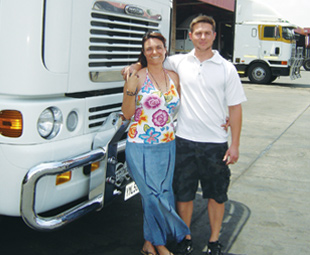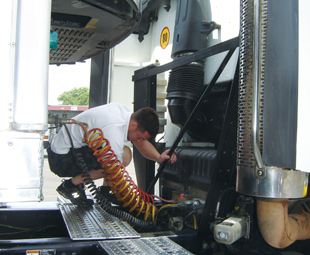A life on the road

What better way to learn about the ins and outs of the trucking industry than to drive a truck oneself? This is exactly what Marius de Lange, owner of Cadman Carriers, has done, and with eight months’ owner-driver experience now under his belt, he’s learnt enough about trucking life to keep him – and his trucking business – on the road.
The Road Freight Association (RFA) estimates that there are approximately 1.5 million trucks (including trailers) on our roads at any given time. Given that the average truck can carry a payload of anything between 2 and 36 t, that’s a lot of cargo moving around the continent. With the RFA predicting as many as 200 000 owner-managed transport businesses in the near future, commercial transport is a billion-rand industry with relatively low barriers to entry.
But it’s a challenging business, and as many entrants face failure as success. Badly maintained vehicles, poor road conditions and transporters undercutting one another to secure deals are just some of the issues. For drivers who spend long hours on the road, loneliness and a lack of family life are also personal challenges that deter potential candidates from entering the industry.
When asked why he chose such a competitive, unpredictable and sometimes cut-throat industry, 26-year-old De Lange’s reply is non-plussed: “I grew up around trucks, although my first professional career was as a bike racer. The time came when I began looking for a career change, though, which is when I sold my bikes and bought my first truck. I knew that if I wanted to own a successful transport company, I’d need to first drive a truck myself.” Which is how De Lange became not only a transport operator, but an owner-driver too.
Truth be told, he wasn’t the only one paying his dues on the road. His wife, Samantha, made up the other half of a partnership that saw them team up 24/7, often in circumstances where one’s mood is governed by fatigue, hunger and a strong yearning for a warm bed and a recuperative sleep.
“We made a great team though,” admits De Lange. “While I was driving, my wife was either making sure I was awake or doing invoicing and other administrative tasks on her laptop, having a sleep or doing her yoga in the sleeping cab. We talked a lot, laughed and had fun together.”
MEETING CHALLENGES HEAD-ON
The arrangement was not to build his marriage, however, but rather as a means of really understanding the transport industry from the inside out. De Lange’s experience as a driver has equipped him with the knowledge and understanding necessary to hopefully make his business great.
For example, timing is everything in the transport business. The smallest delay at any stage of the journey could mean the difference between being at the front or back of a queue of trucks waiting to offload at the next destination, which, in turn, will create further delays down the road.
“Offloading a fully-laden 20-t truck of fish can take several hours,” says De Lange. “For example, arriving late at a destination because of a breakdown could mean finding the packers either on lunch or, worse, the depot locked and everyone gone home.
“An overnight delay like that can cost an operator his relationship with the customer, as we are only ever as good or as reliable as our last job in this business.”
A lack of industry standards with regards to pricing, and transporters that are notorious for undercutting one another ensure that the local commercial transport arena is not for the faint hearted.
In De Lange’s opinion, unregulated competition is also negatively impacting on both the condition of roads and the safety of those using them.
 “With all these transporters fighting for a piece of the cake, the condition of our roads can only get worse,” he says. “Add to this drivers who are inadequately trained to handle large loads; driving on minimal sleep; and operators who cut costs through not maintaining their trucks as regularly as they should; and it’s no surprise we have so many truck accidents and breakdowns on our roads.”
“With all these transporters fighting for a piece of the cake, the condition of our roads can only get worse,” he says. “Add to this drivers who are inadequately trained to handle large loads; driving on minimal sleep; and operators who cut costs through not maintaining their trucks as regularly as they should; and it’s no surprise we have so many truck accidents and breakdowns on our roads.”
Even those operators who know the industry inside and out must stay ahead of the game to beat the odds against them.
“The seriousness of running a trucking business soon sets in when one considers the costs of operation, as well as down-time caused by unexpected breakdowns or the like,” explains De Lange. “Overheads are high at around R100 000 per month and a breakdown can cost a business anything up to R4 000 a day in lost revenue.”
This is where a good technical support system becomes vital. “When you drive 22 000 km a month, a good engine is your saving grace,” he says. “All my trucks have Cummins engines in them. They’re built to pull the kinds of loads we carry, and the fact that they have branches across both the country and continent helps immensely. When your truck breaks down in a remote place outside Upington or Ojiwaranga in Namibia, it’s important to know that a team is going to get to you quickly and back on the road shortly thereafter.”
Another operational challenge is the constant search for good drivers. “In South Africa, there is a huge shortage of Code 14 drivers, largely as a result of poor salaries and tough working conditions,” admits De Lange. “In such a price-conscious industry where a contract can be lost for as little as R500, financial pressures can often impact on the quality of drivers employed and how well they are incentivised to meet targets.
“Underpaid and inexperienced drivers can cause accidents,” he continues. “Some companies pay per kilometre and so the more kilometres drivers accumulate over the shortest period of time, the more they earn. This situation often leads to drivers falling asleep behind the wheel.”
According to the RFA, the primary reason behind road accidents involving trucks is a lack of respect for trucks on the road by drivers in passenger vehicles, including cutting in front of trucks when overtaking and pushing into queues at lights and stop streets.
“Unfortunately, there are very few studies and statistics available detailing the causes of these incidents and crashes,” says De Lange. “This is why we as operators need to be particularly vigilant.”
De Lange, who used his time on the road to recruit drivers at the truck stops he himself frequented, incentivises his staff in a different manner.
“Each of the drivers I employ receives an additional monthly bonus for looking after his truck,” he says. “This includes not only taking care of the truck’s tyres and other important parts and components, but keeping the outside and inside of the cab and trailer clean as well. It’s important that operators work as a team with their drivers and that they each get something meaningful from the relationship and the work they do.”
A STUDENT OF THE ROAD
“I know from driving long distances myself that you do get driving fit,” says De Lange. “You learn tricks to keep yourself awake, such as sticking your head out of the window and letting the fresh air recharge you. Then there’s the old-fashioned method of a klap in the face – by my own hand of course!”
De Lange’s wife, Samantha, adds her own reminiscences: “Sometimes I’d wake up because the truck had stopped and the quiet had woken me, to find Marius doing star jumps in front of the truck’s headlights,” she recalls. “A moment’s doze could mean a missed deadline, stolen wheels or even the precious cargo raided, all of which could mean the contractor would pay us less. There is a fine line between getting the job done and doing it safely, and it’s a line we needed to find and perfect.”
According to De Lange, while endless cups of coffee and Coke also keep a driver awake, this and other food choices take their toll on one’s health. “Many drivers get food poisoning from unsavoury food on the road, while others don’t eat to avoid dirty restrooms and loss of time,” he elaborates. “In many cases the conditions of truck stop restrooms are appalling; we’ve even showered with plastic bags over our flip flops and then thrown the bags away afterwards. Sitting in a truck for hours on end also takes its strain on the kidneys.”
But driving a truck has its lighter side too and for those with an adventurous soul, it can be a great source of fun. De Lange and his wife have learnt to expect the unexpected.
“Samantha and I once had to reload a few tons of fish by ourselves in Namibia. It was summer so we were in shorts and T-shirts in a refrigerated trailer offset at -18 oC,” he remembers. “We did it in half an hour, but emerged from the fridge with lots of bruises from the frozen fish and goosebumps that took more than a few minutes of sunlight to settle.”
The ever-changing scenery is also a big plus. “We’ve seen things that a normal person wouldn’t see in their lifetime,” says De Lange. “We particularly love Piketburg. On one trip, there was snow on the mountains on one side and then beautiful yellow flowers waiting on the other; yet, most South Africans could not find Piketburg on a map.”
For De Lange, the camaraderie between fellow truck drivers and the chance to see South Africa from the unique perspective of a truck cab makes up for the discomfort, rude drivers and tight deadlines that are part and parcel of road transportation. But the ultimate sweetener was his chance to work alongside his wife. “I wouldn’t swop my time on the road for anything, it will always stand out as a very special time in our marriage,” he reveals.
Today the owner of two Freightliner Argosy truck tractors, with refrigerated interlink trailers, and drivers hand picked for their experience, knowledge and reliability, De Lange has high hopes for the future. “It’s a tough business, but I believe I have a firm grounding in how to make it work. One day a fleet of Cadman Carriers vehicles will traverse South Africa’s roads,” he concludes.
Published by
Focus on Transport
focusmagsa




